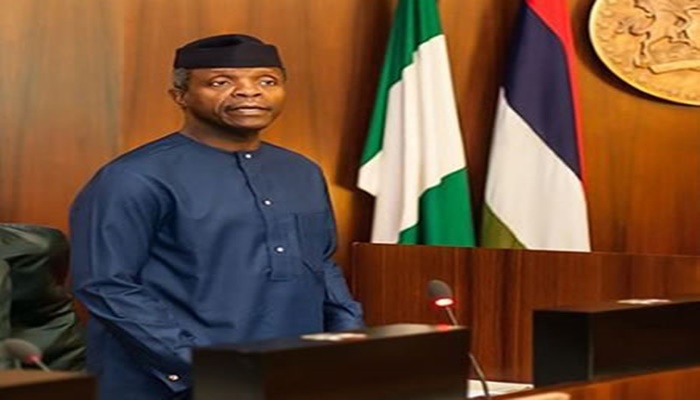
“On its part, the Federal Government will take the outcome of the retreat with all seriousness for the realization of our collective desire, to see that every Nigerian has access to affordable water and adequate sanitation in a sustainable manner by the year 2030.”
Opening address by the Vice President of the Federal Republic Of Nigeria, His Excellency Prof. Yemi Osinbajo, SAN, GCON, at the National Retreat on Revitalizing Urban Water Supply and Sanitation, at Sheraton Hotel And Towers, Abuja, On 28th September, 2017.
Protocol:
I am pleased to address the water family once again, this time on the occasion of the National Retreat on Revitalizing Urban Water Supply and Sanitation in our country.
I was here barely a year ago on the 7th November 2016, at the launching of the Partnership for Expanded Water Supply, Sanitation and Hygiene (PEWASH), which was then targeted at the rural areas. This time the urban populace is in focus. So I must commend the Hon. Minister and his team for their far-sightedness and dynamism in creating timely opportunities to reflect on the critical issues in this all important sector.
There is hardly any need now to make the argument that water supply and sanitation has a multi-level impact on other sectors in the human development value chain, and ultimately on the larger paradigm of poverty and productivity. Thus by directly impacting key indicators in the health, education, agriculture/food, security, and environment sectors, water supply has a profound impact on the quality of life indicators and is a major determinant of productivity and poverty.
In this sense, water supply and sanitation is, as the World Bank as said, the single sector investment with high, and most diverse, multi-sector returns. As further observed by the World Bank, from an economic policy and strategic standpoint, it is unlikely that any other sector could have a larger, more substantial, and immediate impact on poverty reduction in Nigeria. It therefore simply makes sense for government to ensure that the water sector is and remains a primary focus of policy and action.
This explains why the President, from the inception of this administration, has demonstrated serious commitment to the development of the water sector by first of all, preserving the Ministry of Water Resources as a distinct entity and appointing a seasoned young engineer as the Minister. (Applause).
Secondly, the government has prioritized water and sanitation infrastructure in our infrastructure development objectives.
Thirdly, both our Economic Recovery and Growth Plan and our strategies for mainstreaming the Sustainable Development Goals, clearly prioritize water and sanitation.
But perhaps of the greatest moment for the water sector, are the well thought out and creative initiatives that the Ministry has formulated over time, aimed at transforming the water sector, and meeting all our national aspirations in this regards and all the SDGs.
Despite the giant strides that have been made, the challenges are considerable and would require continuing resourcefulness and hard work.
The World Bank and other authoritative studies through the years have shown and I quote, “rapid population growth and urbanization have not been accompanied by a commensurate increase in the delivery of essential urban services such as water supply, sewerage, sanitation and the collection and disposal of solid wastes.”
Although the percentages of the urban and semi-urban population that have access to reliable water supply have improved over the years, there is still a rather long way to go.
Also, the overall effective urban water supply coverage as a proportion of the total population due to poor maintenance and unreliability of supplies, is still under 50 percent.
Our country is vast, the rate and pace of urbanization is alarming, swift action, creativity and synergy on the part of governments at all levels is imperative to bridge the demand-supply gap in the urban areas in particular.
The times we are in are both challenging and full of opportunities. Global best practices are more readily available now than ever before, and the vibrancy of thought and action we have seen from the Ministry and the water family generally already show a willingness to think outside the box.
This retreat, will be an opportunity to share and refine those ideas, and emerge with practical solutions that will rapidly improve access to pipe borne water and adequate sanitation in our urban areas.
On its part, the Federal Government will take the outcome of the retreat with all seriousness for the realization of our collective desire, to see that every Nigerian has access to affordable water and adequate sanitation in a sustainable manner by the year 2030.
I have been informed that the water supply, sanitation and hygiene poverty diagnostic report that I will shortly be launching, gives an overview of the state of water supply, sanitation and hygiene services in the country based on a number of national data sources, desk reviews, and original research to analyze service delivery in the country, and assessment of the sector’s performance by the World Bank.
It is therefore my hope, that the report will provide the necessary inputs for the retreat towards making informed recommendations.
In this regard, I must express our deep appreciation to the World Bank and especially our dear friend, Rasheed, for assisting the Ministry to prepare this important report and indeed all the development partners for their support to the water sector.
Distinguished ladies and gentlemen, it is now my honor and privilege to launch the Nigeria Water Supply, Sanitation and Hygiene (WASH) Poverty Diagnostic Report and also declare the retreat open.
I thank you for your attention and God bless






